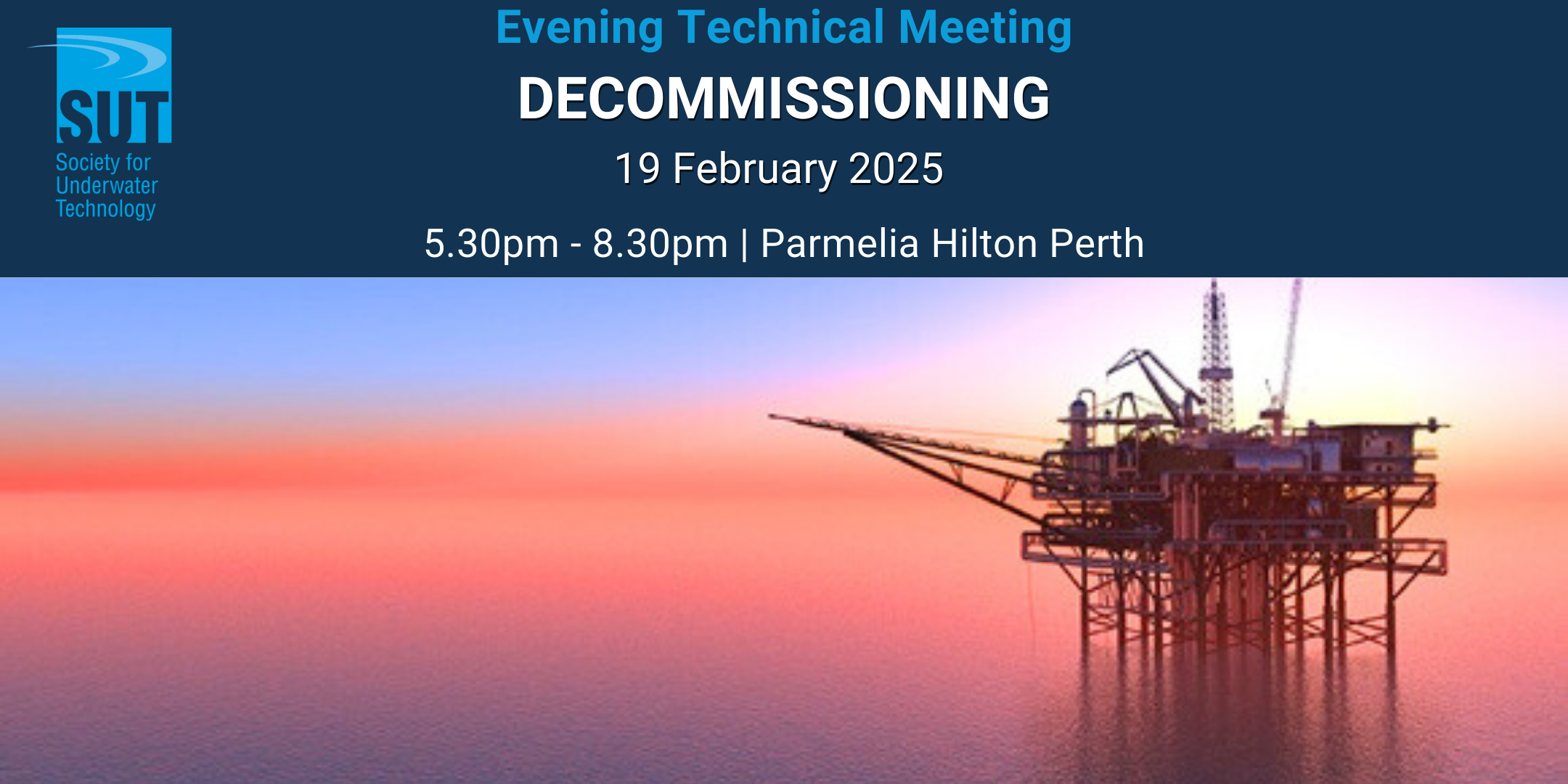Perth – February Evening Technical Meeting: Decommissioning
19 February, 2025
The Society for Underwater Technology invite you to the February 2025 Evening Technical Meeting:
We’ll have three topics on the evening:
1. CASE STUDY ON EFFICIENT REMOVAL OF SUBSEA EQUIPMENT
Brett Phillips, Centurion
With specific reference to an ongoing project in the Gulf of Thailand this presentation explores advancements in technologies and techniques to improve the efficiency of operations and overall reduction of costs for the end customer. Focusing on the cutting and recovery of subsea flowlines and infrastructure, this presentation will cover a range of equipment currently available in the market and advancements in practices in recent years across the industry.
With experience gained across the North Sea and APAC regions we will explore what has differentiated certain types of equipment for improved efficiency in operations. Where industry utilises different cutting methods subject to various conditions. The presentation will also discuss some in-house designed and developed cutting equipment that has been through continued development cycles employing lessons learnt along the way. We will demonstrate both the improved cutting efficiency as well as reduced maintenance, improved cutting consumable durations and improved reliability. Factors that have resulted in considerable efficiency gains for the end customer.
2. NOVEL APPROACHES TO RE-PURPOSING AND SUSTAINABLE DECOMMISSIONING OF AGING OFFSHORE ASSETS
Shreenath Natarajan, 2H Offshore
The decommissioning of offshore infrastructure presents significant technical, economic, and environmental challenges for Australia’s oil and gas industry. This presentation examines innovative methodologies for re-purposing ageing assets and implementing cost-effective decommissioning strategies relevant to the Australian continental shelf. Through analysis of multiple case studies, we evaluate emerging techniques including float-over technology, jack-up rig applications, and specialised barge solutions that have demonstrated substantial cost reductions while maintaining rigorous safety and environmental standards.
The presentation further explores frameworks for marine spread utilization and introduces novel solutions for disposal yard logistics that address regional capacity constraints including systematic assessment of infrastructure repurposing opportunities. The results suggest that integrated planning approaches that incorporate these innovative techniques may potentially result in significant cost savings compared to conventional methods, while also contributing to enhanced environmental outcomes.
This work provides valuable insights for operators and regulators in developing economically viable and environmentally responsible decommissioning strategies for Australia’s maturing offshore energy infrastructure.
3. INNOVATING OFFSHORE DECOMMISSIONING: PROTECTING BIODIVERSITY AND MICROPLASTIC GUIDELINE DEVELOPMENT
Dr. Sander Scheffers, Hydrobiology
The decommissioning of offshore infrastructure presents unique challenges and opportunities for environmental management, particularly in safeguarding marine biodiversity and ensuring water and sediment quality. Developing robust environmental guidelines tailored to decommissioning activities is critical to balancing ecological protection with operational efficiency.
This presentation focuses on biodiversity studies, water quality, and sediment quality guideline values (GV) for microplastics to inform decision-making and streamline regulatory compliance in the decommissioning process. Drawing on historical environmental data and site-specific monitoring, baseline conditions for marine biodiversity and water/sediment quality can be established. These baselines underpin the development of GVs, ensuring flexibility and precision across diverse decommissioning scenarios.
We will provide an in-depth examination of microplastics, including leachable toxicants and mechanical impacts. Hydrodynamic and sediment transport modelling, paired with ecotoxicological studies, evaluates contaminant dispersal mechanisms, exposure pathways, and biological sensitivities.
PROGRAMME & REGISTRATION:
- 5.30 pm – 5.55 pm Registration
- 6.00 pm – 7.30 pm ETM Presentations
- 7.30 pm – 8.30 pm Networking drinks & nibbles
To view the flyer, click HERE
This ETM is proudly sponsored by:
For event enquiries Contact: SUT (08) 9481 0999 or email [email protected]


